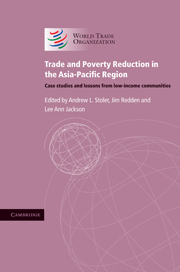 Trade and Poverty Reduction in the Asia-Pacific Region
Trade and Poverty Reduction in the Asia-Pacific Region Published online by Cambridge University Press: 05 March 2012
Introduction
Economists have championed the merits of international trade since Adam Smith. Indeed, advocacy of free trade permeates the field to such an extent that 97 per cent of economists believe that tariffs and quotas diminish welfare. However, the poverty-alleviating potential of trade is not something that is necessarily realised; thus care must be taken to temper this advocacy with consideration of the transmission mechanisms between trade and the poorest members of society. Accordingly, the economic literature is replete with such considerations. The purpose of this chapter is to provide an overview of this literature in order to establish the theoretical background for the case studies that comprise this volume. One of the key outcomes is that the effects of trade on poverty are context specific. Consequently, no attempt is made here to derive a holistic or definitive description of the impact of trade liberalisation on the poor, as, in reality, there are a multiplicity of effects that vary across countries and across time. Instead, this study develops a set of factors that can potentially influence the nature and magnitude of the effects of trade on poverty alleviation. In each individual setting, a different set of factors will pertain, leading to different outcomes. Accordingly, policies should be tailored to the prevailing conditions within the country in question. Nevertheless, some generalised policy prescriptions can be derived and, as such, this chapter concludes with a discussion of how policy makers can influence the factors that mediate the effects of trade on poverty.
To save this book to your Kindle, first ensure [email protected] is added to your Approved Personal Document E-mail List under your Personal Document Settings on the Manage Your Content and Devices page of your Amazon account. Then enter the ‘name’ part of your Kindle email address below. Find out more about saving to your Kindle.
Note you can select to save to either the @free.kindle.com or @kindle.com variations. ‘@free.kindle.com’ emails are free but can only be saved to your device when it is connected to wi-fi. ‘@kindle.com’ emails can be delivered even when you are not connected to wi-fi, but note that service fees apply.
Find out more about the Kindle Personal Document Service.
To save content items to your account, please confirm that you agree to abide by our usage policies. If this is the first time you use this feature, you will be asked to authorise Cambridge Core to connect with your account. Find out more about saving content to Dropbox.
To save content items to your account, please confirm that you agree to abide by our usage policies. If this is the first time you use this feature, you will be asked to authorise Cambridge Core to connect with your account. Find out more about saving content to Google Drive.